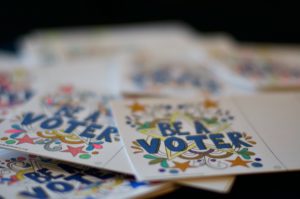Featuring Danielle Gruber, Kol Koleinu Fellow

The purpose of Voting with a Feminist Lens is to embolden soon-to-be voters and newly registered voters to make their votes meaningful. Over the course of three hour-long sessions, we cover the importance of voting, with emphasis on the history of the women’s suffrage movement; the logistics of voting and voter registration; how women’s rights relate to social, political, and economic issues; and choosing a candidate that represents your values. This workshop is non-partisan, and welcomes teens of all genders and perspectives.
The sessions were offered virtually over three Thursdays (October 8, 15, and 22) from 7:00-8:00 p.m. EDT, by Moving Traditions in partnership with BBYO, Jewish Feminist Alumnae Network, Union for Reform Judaism (NFTY), and United Synagogue Youth (USY).
Access curriculum for the workshop here.
October 8 session: Why is voting important? Who can you vote for and when?
The first session covers the importance of voting, with an emphasis on the history of the women’s suffrage movement. Upon completion of this session, participants will know:
- Key events in the history of the women’s suffrage movement
- How motivation for voting and barriers to voting have changed and remained the same since the 19th amendment was passed in 1920
- What motivates them personally and which barriers may affect them
October 15 session: Which issues matter to you most?
The second session helps participants gain a better sense of the issues that matter to them and learn how their feminism might inform their positions. Upon completion of this session, participants will know:
- Some of the key issues that are a basis for political conversation today, including the major positions taken on those issues
- Issues they care about and their values in the context of the political landscape
- How women’s rights relate to these key issues and values
October 22 session: What do you look for in a candidate?
The final session breaks down candidate selection into several more manageable parts, which can help to enhance voters’ confidence in their decisions. Upon completion of this session, participants will know:
- The steps in selecting a candidate and which resources they can use to inform their decisions
- Awareness of the biases that may influence their perceptions of candidates
- Double standards for male and female candidates